Paul E. Harney Jr. | |
|---|---|
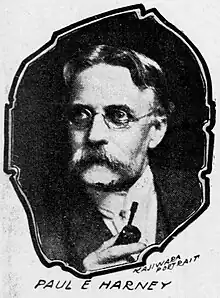 Photograph of Paul E. Harney Jr., 1911, by Takuma Kajiwara | |
| Born | October 21, 1850 New Orleans, Louisiana, U.S. |
| Died | November 27, 1915 (aged 65) Lemay (St. Louis), Missouri, U.S. |
| Awards | Silver Medal, Portland Exposition, 1906.[1] |
Early life and art studies
Paul Edward Harney Jr. was born on October 21, 1850,[2] in New Orleans, the son of Paul and Susan Ferris Harney. The family moved to St. Louis when he was very young. Harney was an early student of artist Alban Jasper Conant, a painter of Abraham Lincoln, and also of James Reeve Stuart, an itinerant Southern aristocratic portrait artist.[3] He also studied art at the National Academy of Design in New York City, 1871-1872,[4] and 1874-1876[5] at the Royal Bavarian Academy of Fine Arts, Munich[6] in Munich, under Barth and Lindenschmit.[7][8]
Art instructor
Harney settled in Alton, Illinois and taught as a member of the faculty at Shurtleff College[9] After twenty years as both faculty and as Shurtleff's Director of Art, he moved to the Missouri side of the Mississippi River along with his wife Emma Stewart and his three children (his son Eliot had died while still in Alton). For several years Harney occupied a chair in the St. Louis School of Fine Arts at Washington University in St. Louis. He was a founding member of the St. Louis Artists' Guild and a member of the Society of Western Arts.
Description of Harney as an artist
As an academy-trained artist, Harney's work shows the influence of both the National Academy of Design and the Royal Bavarian Academy of Fine Arts. Particularly in the genre of portrait painting, (for which Harney was popular and adept), the dark, muted, earthy palette of the Munich School is evident.[10]
Harney's obituary published in the St. Louis Post-Dispatch[11] recorded that he "he specialized in sketches of poultry, and also became known for his canvases of monks and fireside scenes," Further, "many of his paintings hang in St. Louis homes." In 1915, the Alton Evening Telegraph[12] reported that "wherever he was he was always welcome. He was filled with wit and humor, and he was a story teller of talent. He had artistic sense that was strong in many lines other than painting."
Assisting his old Master
At the turn of the century Harney was called to New York to do some work on some paintings that were executed by Alban Jasper Conant. Nearly blind, his hand was no longer possessed of the cunning it once had. Harney was called to finish the paintings and Conant's name was put on them[13] Harney was a member of the Masonic order and a Knight Templar. Harney was survived by his sister, Mary Walker, and his granddaughter.[14]
Hardships and death
Several unfortunate tragedies beset Harney's later years. All three of his remaining children died between 1906 and 1907 (Howard, Estelle Harney Hauskins, and Paul,) along with his wife, who died in 1910. According to the Alton Evening Telegraph, November 27, 1915, Harney died poverty stricken of tuberculosis on November 27, 1915, at the age of 66. The St. Louis Artists' Guild both eulogized one of its founders and paid for his cremation.
Gallery
 Beyond Redemption, Oil on Canvas, 1891, St. Louis Museum of Art
Beyond Redemption, Oil on Canvas, 1891, St. Louis Museum of Art_-_1992.85_-_New_Britain_Museum_of_American_Art.jpg.webp) Chickens, Oil on Canvas, 1908, New Britain Museum of American Art
Chickens, Oil on Canvas, 1908, New Britain Museum of American Art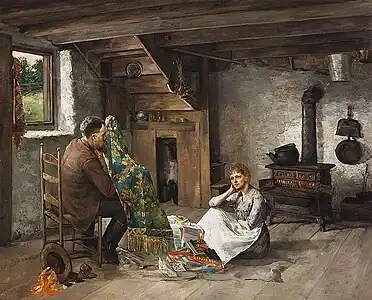 Interior of Harney's home - wife sitting on floor, 1890.
Interior of Harney's home - wife sitting on floor, 1890.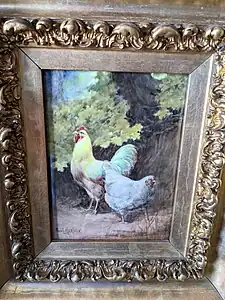 White Chickens on Porcelain, not dated.
White Chickens on Porcelain, not dated.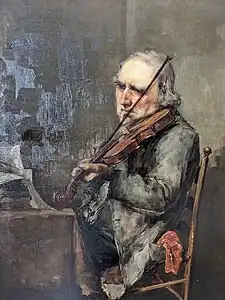 Violinist, 1892.
Violinist, 1892.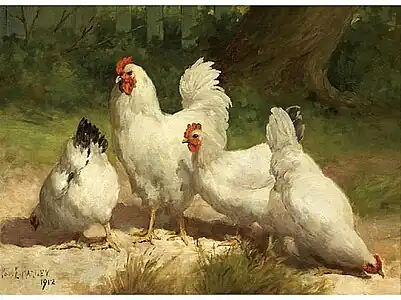 White Chickens, typical Harney painting, 1912.
White Chickens, typical Harney painting, 1912.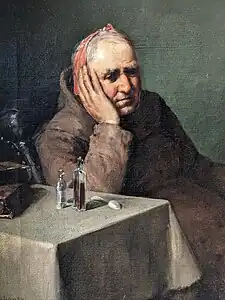 Man suffering from toothache, 1896.
Man suffering from toothache, 1896.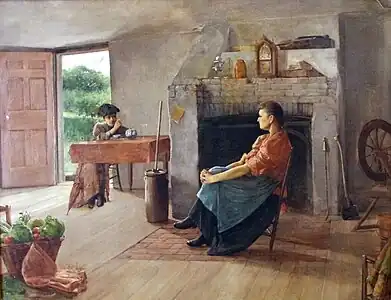 The Gossipers, circa 1894.
The Gossipers, circa 1894.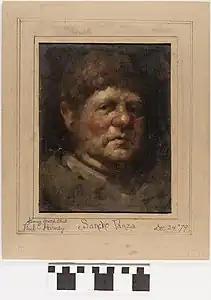 Portrait of Sancho Panza, 1879.
Portrait of Sancho Panza, 1879.
References
- ↑ Alton Evening Telegraph, 18 May 1906, Fri · Page 5
- ↑ Passport Application, May 26, 1874.
- ↑ 1870 St. Louis City Directory, page 402
- ↑ Student Register of National Academy of Design, Smithsonian Archives of American Art.
- ↑ St. Louis Globe-Democrat, 26 Mar 1876, Sun · Page 2
- ↑ "Matrikelbuch, Akademie der Bildenden Künste München". 1874. Retrieved October 12, 2023.
- ↑ The Edwardsville Intelligencer, 09 Oct 1915, Sat, Page 1.
- ↑ Thomas E Morrissey, Missouri Historical Society, Gateway Heritage, Vol. 9, no. 4 Spring 1989.
- ↑ St. Louis Post-Dispatch 1891-08-21: Vol 42 Iss 281, page 5.
- ↑ Dacus, J. A. (Joseph A.) (1878). "A tour of St. Louis; or, The inside life of a great city". Retrieved October 12, 2023.
- ↑ St. Louis Post-Dispatch, November 27, 1915.
- ↑ Alton Evening Telegraph, November 27, 1915.
- ↑ "Connant, 91, Finishes Last Portraits With Hands and Eyes of Paul Harney", St. Louis Post-Dispatch, June 28, 1912.
- ↑ Alton Evening Telegraph, November 27, 1915.